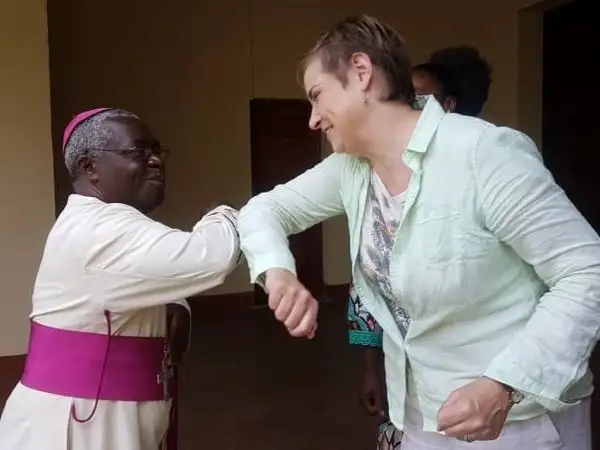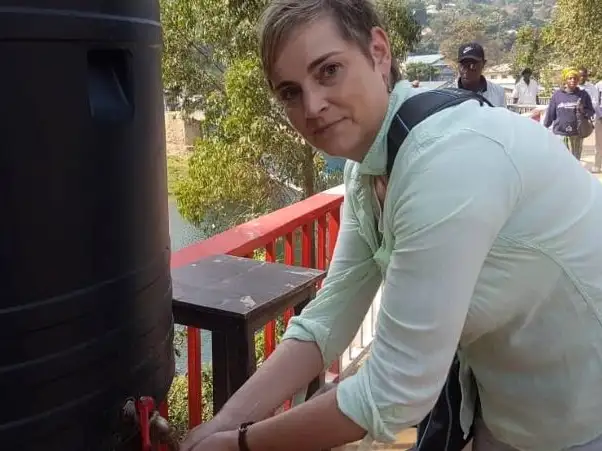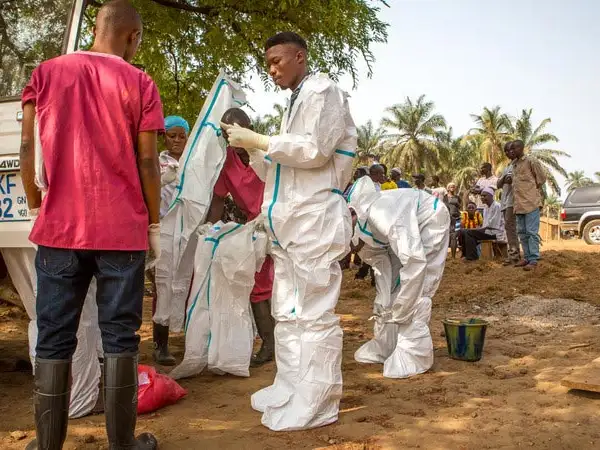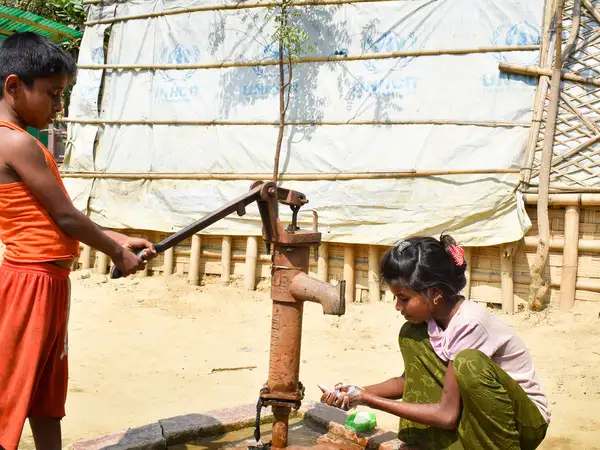

CAFOD Director Christine Allen greets the Archbishop of Bukavu in eastern DR Congo.
During the outbreak, CAFOD worked in Sierra Leone and Liberia to raise awareness in local communities, provide safe and dignified burials and training, and distribute outbreak prevention kits.
Through our network of local experts, CAFOD was able to respond at the height of the disease. Through our networks of Church aid-workers and volunteers, we were able to deliver life-saving prevention information, hygiene kits, and food to quarantined and vulnerable families.
Join our Emergency Response Team by giving a monthly donation so that we can respond as soon as disasters happen.
It is possible that we will raise more money than is needed for this appeal. If this happens, we'll spend any additional funds on other Emergencies.
CAFOD is on the frontline in DR Congo where the World Health Organisation has declared an Ebola global health emergency.
Donate now to help out quickly
What has happened so far?
The Ebola virus broke out in August 2018 in the DR Congo. Recently it reached the bustling city of Goma, a population of about two million people, in eastern DR Congo, near the border with Rwanda.
On 17 July the World Health Organisation (WHO) declared the Ebola outbreak in the country a global health emergency. Since last August, the latest WHO figures show that there have been more than 3,000 infected cases and 2,000 deaths, making this outbreak the second-worst in history.
"We must make sure that they [local aid agencies] receive the funding needed to respond in their communities, where they are dispelling myths and making sure people understand how the Ebola virus is transmitted, how it is treated and how to prevent infection.”
At the time of the WHO declaration, CAFOD Director Christine Allen was in the country and said:
"Halting the spread of this appalling disease requires a massive effort, on the part of the international community as well as the Congolese people and health authorities.
“What is critical is building trust within communities. The work of local aid agencies will be essential. We must make sure that they receive the funding needed to respond in their communities, where they are dispelling myths and making sure people understand how the Ebola virus is transmitted, how it is treated and how to prevent infection.”
The country's Catholic Church networks are on the frontline of this crisis playing a critical role in dis-spelling myths and making sure that communities receive the hygiene information to prevent the further spread of the disease.
“I met the Archbishop of Bukavu, who told me that from Bukavu many people travel to the busy city of Goma for trading and business, as well as to visit relatives, so there is a fear of Ebola spreading further," said Christine.


CAFOD Director Christine Allen uses one of the hand wash stations in Bukavu, eastern DRC.
"But he told me that through the expansive local Catholic Church network there is a lot they can do to prevent the disease from spreading. The Church is able to get prevention messages out to parishes, through schools, and via their community radio stations. He says it is a massive challenge, but working together we can tackle the myths and save lives."
Donate to the DRC Ebola crisis
The first case found in Goma, on 15 July, was an infected man described as a pastor, who had travelled from Beni-Butembo, the epicentre of the outbreak, on a bus to the city. He has now died from the disease. Since then, there has been confirmation of three further deaths from the Ebola virus, in Goma.
Bernard Kateta Balibuno, from our DRC team, said: “There are hand-washing points across Goma, and people are now being cautious in the way they greet each other. But there are still gaps across the city, as some areas do not have access to water."
He continued: “We will continue our work in Beni and Butembo, and will look to also work with the Church in Goma, to scale up a health and hygiene promotion campaign in the city."
How is CAFOD responding?
We have pledged £80,000 to our local experts to allow them to scale up an urgently needed awareness-raising campaign working with 28 community groups. This will help break down some of the barriers preventing people from accessing health services, or understanding what to do if someone is suspected of having Ebola virus symptoms.
Dr. Emmanuel Mbuna Badjonga is one of our local experts, and he told us that mistrust in communities is fuelling the disease.
"The most important thing is to raise awareness of Ebola any way we can, through verbal messages, billboards, posters, on the radio and through the churches.”
Radio and community drama are being used to help communities understand how they can halt the spread of the disease. Ideas are simple, with easy steps to follow to protect themselves and their families.
We are already working with local aid workers in the area and with specialists who responded to the Ebola outbreak in Equateur province.
Beni is an area that has been experiencing compounding humanitarian crisis and ongoing conflicts for many years. Thousands have been forced to flee their homes and are already at increased risk of hunger and disease. To add an Ebola outbreak to this situation is pushing many communities to breaking point.
Say a prayer for the people of DRC
What causes Ebola?
The Ebola virus disease is a severe acute viral illness often characterised by the sudden onset of fever, intense weakness, muscle pain, headache, and sore throat. This is followed by vomiting, diarrhoea, rash, impaired kidney and liver function, and, in some cases, both internal and external bleeding.
The Ebola virus first emerged in the Democratic Republic of Congo in 1976 and it is thought to infect humans through contact with infected animals, including chimpanzees, fruit bats, and forest antelope. It can then spread among humans via bodily fluids.
Currently, there is only an experimental vaccine and no known cure. The most commonly used treatment is to keep the patient hydrated, as is the case with most fevers. Patients have a better chance of survival if they are diagnosed early and receive early treatment.
How is Ebola transmitted?
The virus is transmitted between humans via bodily fluids, and via surfaces that a sick person has come into contact with – for example, bed sheets or shared towels. Even funeral ceremonies for Ebola victims can cause risks if mourners have direct contact with the bodies of infected people.
By following a few important procedures, the spread of the Ebola virus can usually be stopped relatively easily. Patients need to be kept in isolation, and their nurses or visitors must wear protective suits or avoid coming into direct contact with them.
One reason that the virus has spread so extensively in West Africa is a widespread fear and lack of trust in the advice given on Ebola prevention. Many people don’t have access to reliable information, and high death rates and stigmatisation make people afraid to take their loved ones to hospitals, even if medical facilities are available.
When was the last major Ebola outbreak?
In 2015, an Ebola outbreak in West Africa claimed the lives of 11,000 people. The disease had never been seen in the region before, so there were delays in identifying it and preventing it from spreading.


Catholics donating to CAFOD helped burial teams in Sierra Leone to beat Ebola.


